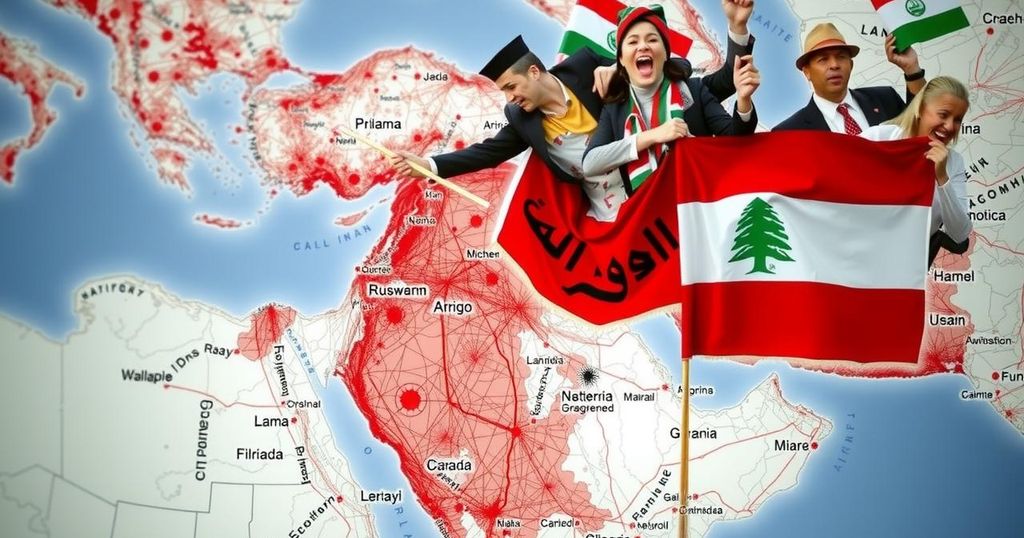Israel’s Ministry of Foreign Affairs released a controversial map claiming territories in Palestine and surrounding countries, provoking protests from Jordan, Qatar, and the UAE. The map has been condemned as a violation of sovereignty and expansionist ambitions, inciting outrage among Palestinians and Arab nations alike. Jordan, Qatar, and the UAE have called upon the international community to intervene against these perceived threats to peace and stability in the region.
A diplomatic crisis has arisen following the release of a new map by the Israeli Ministry of Foreign Affairs, which asserts historical territorial claims over Palestine and significant portions of neighboring countries including Jordan, Lebanon, and Syria. The map, publicized on Arabic-language social media, depicts Israel as established in biblical times and has been met with widespread condemnation from various Arab nations. These countries argue that the map infringes upon their sovereignty by incorporating occupied Palestinian territories along with neighboring lands into the concept of ‘Greater Israel.’ Jordan, the UAE, and Qatar have united in their denunciation, calling for international intervention to address what they perceive as dangerous expansionist ambitions from Israel.
The Israeli Ministry of Foreign Affairs utilized social media to assert the historical existence of Israel, stating, “Did you know that the Israeli empire was established 3,000 years ago?” This announcement elaborated on Israel’s democratic history and its biblical roots, citing the reigns of King Saul, King David, and King Solomon. The ensuing uproar among Palestinians and Arab nations underscores deeply rooted tensions over land and national identity, prompting these nations to seek solidarity against perceived Israeli expansionism.
The background to this situation encompasses long-standing disputes regarding territory in the region, heightening tensions in a context where peace processes are fragile. The map disseminated by Israel suggests a significant historical claim to land that many Arab states contend was unjustly claimed, further complicating any future negotiations aimed at establishing lasting peace and coexistence. Jordanian, Qatari, and Emirati officials have each articulated strong disapproval of the map.
Jordan’s Ministry of Foreign Affairs condemned the depiction as “accusations and confusion” aimed at undermining the establishment of a Palestinian state. In a similar vein, Qatar characterized the map as a “blatant violation” of international standards and warned that such actions could endanger regional peace. The UAE also expressed grave concerns, describing the map’s portrayal as a gross infringement on international law and an exacerbation of existing conflicts.
In conclusion, Israel’s controversial new map has ignited protests from Jordan, Qatar, and the UAE, who view it as a challenge to their territorial integrity and a reversal of peace processes. The condemnation reflects a collective Arab response to what they perceive as Israel’s ongoing expansionist objectives, highlighting the urgent need for reinforced international oversight and intervention to prevent further escalation of tensions in the region. The international community is urged to act decisively in response to these developments, which threaten to destabilize an already volatile environment.
The new map released by Israel represents a collection of historical claims asserting that the Jewish state has established rights over areas currently recognized as Palestine as well as parts of Jordan, Lebanon, and Syria. This claim is deeply rooted in historical narratives and positions articulated since the establishment of the state of Israel in 1948. The release of this map is seen as part of ongoing tensions within the Israeli-Palestinian conflict and reflects broader regional struggles involving territorial sovereignty and national identities.
Israel’s release of a new map claiming significant territories has sparked a substantial diplomatic backlash from several Arab nations. The accusations of expansionism have ignited a sense of urgency for international intervention to address these grievances and protect the sovereignty of the affected nations. As tensions escalate, the necessity for robust dialogue and constructive engagement among involved parties becomes more critical to achieving stability in the region.
Original Source: www.india.com






